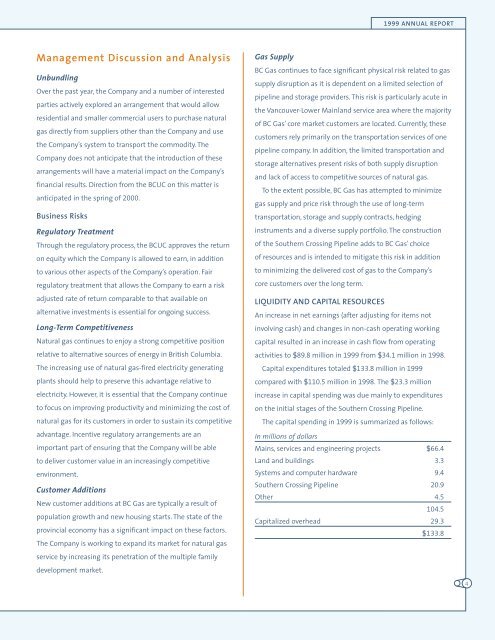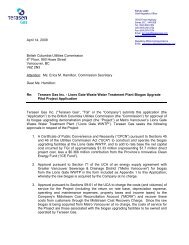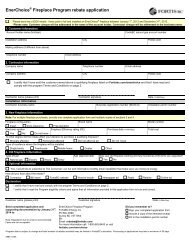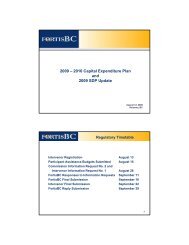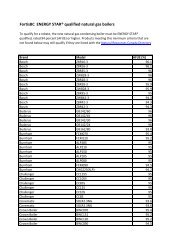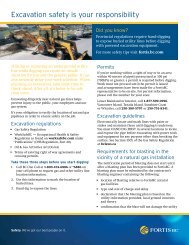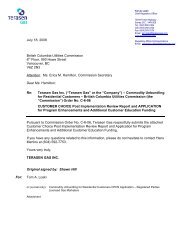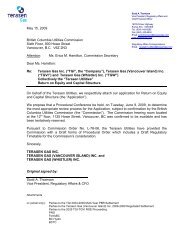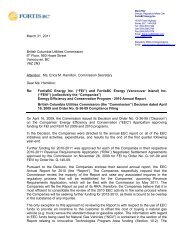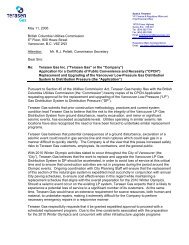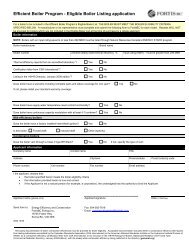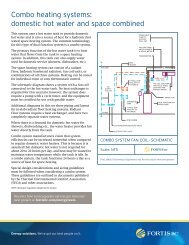1999 BC Gas Utility Ltd. annual report - FortisBC
1999 BC Gas Utility Ltd. annual report - FortisBC
1999 BC Gas Utility Ltd. annual report - FortisBC
You also want an ePaper? Increase the reach of your titles
YUMPU automatically turns print PDFs into web optimized ePapers that Google loves.
Management Discussion and Analysis<br />
Unbundling<br />
Over the past year, the Company and a number of interested<br />
parties actively explored an arrangement that would allow<br />
residential and smaller commercial users to purchase natural<br />
gas directly from suppliers other than the Company and use<br />
the Company’s system to transport the commodity. The<br />
Company does not anticipate that the introduction of these<br />
arrangements will have a material impact on the Company’s<br />
financial results. Direction from the <strong>BC</strong>UC on this matter is<br />
anticipated in the spring of 2000.<br />
Business Risks<br />
Regulatory Treatment<br />
Through the regulatory process, the <strong>BC</strong>UC approves the return<br />
on equity which the Company is allowed to earn, in addition<br />
to various other aspects of the Company’s operation. Fair<br />
regulatory treatment that allows the Company to earn a risk<br />
adjusted rate of return comparable to that available on<br />
alternative investments is essential for ongoing success.<br />
Long-Term Competitiveness<br />
Natural gas continues to enjoy a strong competitive position<br />
relative to alternative sources of energy in British Columbia.<br />
The increasing use of natural gas-fired electricity generating<br />
plants should help to preserve this advantage relative to<br />
electricity. However, it is essential that the Company continue<br />
to focus on improving productivity and minimizing the cost of<br />
natural gas for its customers in order to sustain its competitive<br />
advantage. Incentive regulatory arrangements are an<br />
important part of ensuring that the Company will be able<br />
to deliver customer value in an increasingly competitive<br />
environment.<br />
Customer Additions<br />
New customer additions at <strong>BC</strong> <strong>Gas</strong> are typically a result of<br />
population growth and new housing starts. The state of the<br />
provincial economy has a significant impact on these factors.<br />
The Company is working to expand its market for natural gas<br />
service by increasing its penetration of the multiple family<br />
development market.<br />
<strong>Gas</strong> Supply<br />
<strong>1999</strong> ANNUAL REPORT<br />
<strong>BC</strong> <strong>Gas</strong> continues to face significant physical risk related to gas<br />
supply disruption as it is dependent on a limited selection of<br />
pipeline and storage providers. This risk is particularly acute in<br />
the Vancouver-Lower Mainland service area where the majority<br />
of <strong>BC</strong> <strong>Gas</strong>’ core market customers are located. Currently, these<br />
customers rely primarily on the transportation services of one<br />
pipeline company. In addition, the limited transportation and<br />
storage alternatives present risks of both supply disruption<br />
and lack of access to competitive sources of natural gas.<br />
To the extent possible, <strong>BC</strong> <strong>Gas</strong> has attempted to minimize<br />
gas supply and price risk through the use of long-term<br />
transportation, storage and supply contracts, hedging<br />
instruments and a diverse supply portfolio. The construction<br />
of the Southern Crossing Pipeline adds to <strong>BC</strong> <strong>Gas</strong>’ choice<br />
of resources and is intended to mitigate this risk in addition<br />
to minimizing the delivered cost of gas to the Company’s<br />
core customers over the long term.<br />
LIQUIDITY AND CAPITAL RESOURCES<br />
An increase in net earnings (after adjusting for items not<br />
involving cash) and changes in non-cash operating working<br />
capital resulted in an increase in cash flow from operating<br />
activities to $89.8 million in <strong>1999</strong> from $34.1 million in 1998.<br />
Capital expenditures totaled $133.8 million in <strong>1999</strong><br />
compared with $110.5 million in 1998. The $23.3 million<br />
increase in capital spending was due mainly to expenditures<br />
on the initial stages of the Southern Crossing Pipeline.<br />
The capital spending in <strong>1999</strong> is summarized as follows:<br />
In millions of dollars<br />
Mains, services and engineering projects $66.4<br />
Land and buildings 3.3<br />
Systems and computer hardware 9.4<br />
Southern Crossing Pipeline 20.9<br />
Other 4.5<br />
104.5<br />
Capitalized overhead 29.3<br />
$133.8<br />
4


